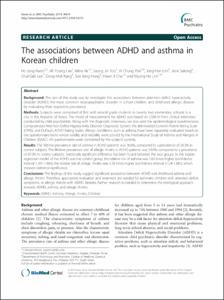KUMEL Repository
1. Journal Papers (연구논문)
1. School of Medicine (의과대학)
Dept. of Preventive Medicine (예방의학)
The associations between ADHD and asthma in Korean children
- Keimyung Author(s)
- Lee, Mi Young
- Department
- Dept. of Preventive Medicine (예방의학)
- Journal Title
- BMC Psychiatry
- Issued Date
- 2014
- Volume
- 14
- Issue
- 70
- Abstract
- Background: The aim of this study was to investigate the associations between attention deficit hyperactivity
disorder (ADHD), the most common neuropsychiatric disorder in school children, and childhood allergic disease
by evaluating their respective prevalence.
Methods: Subjects were comprised of first and second grade students in twenty two elementary schools in a
city in the Republic of Korea. The mode of measurement for ADHD was based on DSM-IV from clinical interviews
conducted by child psychiatrists. Along with the diagnostic interviews, we also used the epidemiological questionnaires,
Computerized Attention Deficit-Hyperactivity Disorder Diagnostic System, the abbreviated Conner’s Parent Rating Scale
(CPRS), and DuPaul’s ADHD Rating Scales. Allergic conditions, such as asthma, have been separately evaluated based on
the questionnaire items whose validity and reliability were proved by the International Study of Asthma and Allergies in
Children (ISAAC). All questionnaires were completed by the subjects’ parents.
Results: The lifetime prevalence rate of asthma in ADHD patients was 36.6%, compared to a prevalence of 24.3% in
control subjects. The lifetime prevalence rate of allergic rhinitis in ADHD patients was 59.0%, compared to a prevalence
of 47.0% in control subjects. Statistically significant difference has been found between the two groups. In the logistic
regression model of the ADHD and the control group, the relative risk of asthma was 1.60 times higher (confidence
interval 1.301-1.964), the relative risk of allergic rhinitis was 1.38 times higher (confidence interval 1.124-1.681), which
showed statistical significance.
Conclusions: The findings of this study suggest significant association between ADHD and childhood asthma and
allergic rhinitis. Therefore, appropriate evaluation and treatment are needed for asthmatic children with attention-deficit
symptoms, or allergic rhinitis with ADHD. Besides, further research is needed to determine the etiological approach
towards ADHD, asthma, and allergic rhinitis.
Keywords: ADHD, Asthma, Allergic rhinitis, Children
- Keimyung Author(s)(Kor)
- 이미영
- Publisher
- School of Medicine
- Citation
- Ho Jang Kwon et al. (2014). The associations between ADHD and asthma in Korean children. BMC Psychiatry, 14(70), 1–7. doi: 10.1186/1471-244X-14-70
- Type
- Article
- ISSN
- 1471-244X
- Appears in Collections:
- 1. School of Medicine (의과대학) > Dept. of Preventive Medicine (예방의학)
- 파일 목록
-
-
Download
 oak-aaa-00002.pdf
기타 데이터 / 283.02 kB / Adobe PDF
oak-aaa-00002.pdf
기타 데이터 / 283.02 kB / Adobe PDF
-
Items in Repository are protected by copyright, with all rights reserved, unless otherwise indicated.